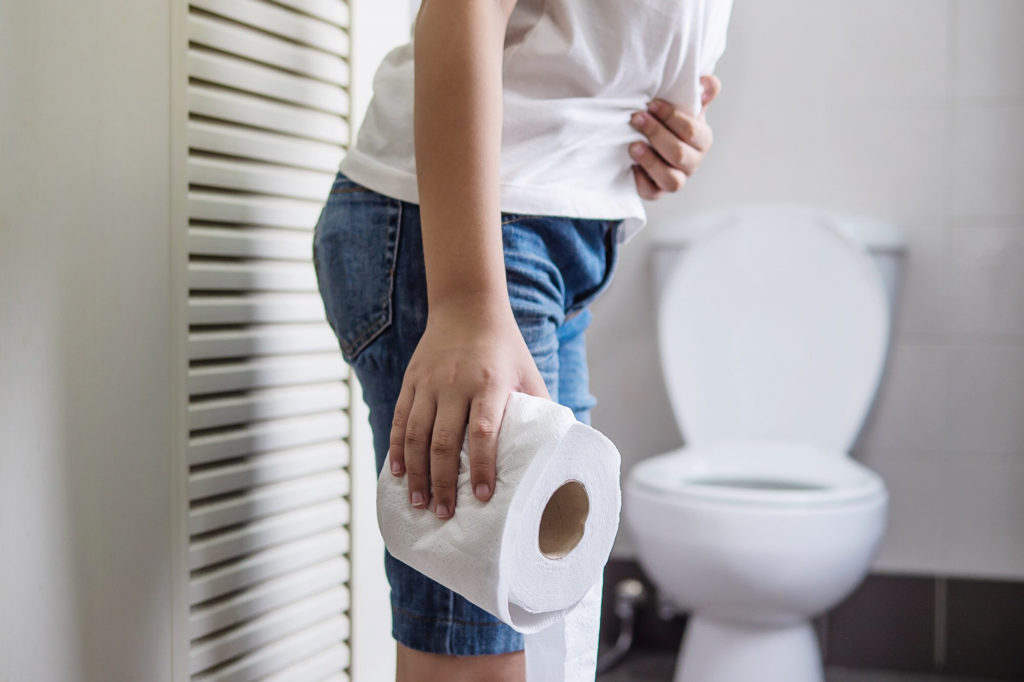Although constipation may seem like a minor inconvenience, if left untreated over time, it can lead to serious health complications. Below is a real-life example that highlights just how dangerous chronic constipation can be, and why it’s crucial not to ignore it.
A Startling X-Ray of Prolonged Constipation
A young woman who had suffered from chronic constipation for years faced a worsening of her condition. After going more than two weeks without a bowel movement, she sought medical attention, only to receive troubling results.

The Root Cause:
When the digestive system is unable to properly eliminate waste, stool begins to accumulate in the colon (large intestine), causing significant pain and discomfort. Over time, the colon can expand beyond its capacity, resulting in severe bloating.
As seen in the X-ray, the colon became so enlarged that it extended upward toward the chest area, nearly reaching the heart. The excessive bloating has flattened the natural folds and wrinkles of the colon, which are essential for its proper function.
If untreated, this condition, which is often overlooked, can lead to life-threatening complications.
Dangerous Consequences of Chronic Constipation
1. Severe Colon Distension:
When the colon is forced to stretch beyond its normal limits, it loses its ability to contract and push stool forward. This worsens constipation, making it increasingly difficult for the body to pass waste.
2. Toxin Build-Up in the Body:
When stool remains in the colon for prolonged periods, toxic substances and bacteria can be reabsorbed into the bloodstream. This can lead to weakened immunity, bloating, foul-smelling breath, acne, and chronic fatigue.
3. Hemorrhoids & Anal Fissures:
Excessive straining during bowel movements can result in hemorrhoids—painful, swollen veins in the rectum—and anal fissures, which are small, painful tears in the anus. Both conditions are extremely painful and can lead to bleeding.
4. Intestinal Blockage (Bowel Obstruction):
One of the most serious risks of untreated constipation is bowel obstruction. A complete blockage can cut off blood supply to the intestines, leading to infections and tissue death (necrosis). In severe cases, surgery may be required to remove the damaged tissue.
5. Increased Risk of Colon Cancer:
Studies suggest that chronic constipation may increase the risk of colorectal cancer. Prolonged stool retention in the colon exposes the body to harmful chemicals that can trigger inflammation and abnormal cell growth, which may lead to cancer.
How to Prevent and Treat Constipation Naturally
Fortunately, making simple lifestyle changes can significantly reduce the risk of constipation. Here are some tips to promote a healthy digestive system:
1. Increase Fiber Intake:
Consume more whole grains, nuts, seeds, fruits, and vegetables to boost your fiber intake. Natural laxatives like apples, pears, prunes, chia seeds, and flaxseeds can help relieve constipation.
2. Stay Hydrated:
Drinking plenty of water—at least 2 to 3 liters (8 to 12 cups) daily—helps soften stool and promotes regular bowel movements. Start your day with warm lemon water to help stimulate digestion.
3. Exercise Regularly:
Movement helps stimulate the intestines and encourages regular bowel activity. Aim for at least 15 to 30 minutes of yoga, stretching, or walking each day.
4. Develop a Consistent Bathroom Routine:
Train your body to go at the same time every day, ideally after meals. Delaying bowel movements can worsen constipation.
5. Limit Processed & Low-Fiber Foods:
Reduce your consumption of red meat, dairy, fried foods, fast food, and refined carbohydrates (such as white bread and sugary snacks). These foods slow down digestion and lead to hard stools.
6. Try Natural Remedies:
Herbal teas like fennel, peppermint, or ginger can aid digestion. Magnesium supplements and aloe vera juice may also help relieve constipation.
Important Reminder:
If you haven’t had a bowel movement in two to three days, it’s time to pay closer attention to your diet and lifestyle. Seek medical advice if constipation lasts for more than a week or if you experience extreme discomfort, bloating, vomiting, or blood in your stool.
Final Thoughts
Constipation is more than just a minor inconvenience—it can evolve into a serious health issue if ignored. By supporting your digestive health and making simple lifestyle changes, you can avoid long-term complications. Small, daily habits are essential for your overall well-being, so listen to what your body is telling you and act accordingly!
Lucky Colors for the 12 Zodiac Signs
Each zodiac sign has specific lucky colors that can enhance positive energy, bring good fortune, and boost confidence. Here are the lucky colors for each sign:



